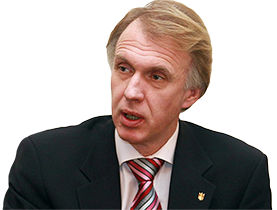Russia refused to comply with the demand by the Council of Europe’s Ministerial Committee to reverse the ban of the Crimean Tatars’ Mejlis. Russia’s Foreign Ministry claims this decision by the European institution is "politically and legally void." Although this move echoes the ruling of the International Court of Justice of April 19, requiring that the Russian Federation in the occupied Crimea should refrain from imposing restrictions on the rights of the Crimean population to have their own representative institutions, including the Mejlis.
Russia resists the call and doesn’t intend to let the Mejlis restore operations because this is one of the matters of principle for Moscow. After all, the Russian leaders simply don’t perceive the Crimean Tatar people as such and any of its representative bodies whatsoever.
In addition, the existence of Mejlis has not seen the Kremlin’s approval, so it has no right to life by definition. Instead, the occupation authorities are now creating fake Crimean Tatar NGOs, appointing traitors of the Crimean Tatar people to lead them and help Moscow promote the idea that everything’s just fine in Crimea.
Long before our time, German Chancellor Bismarck made a remarkable notion that no agreement signed with Russia could be worth a piece of paper on which it is written
It should be noted that for the civilized world, the defiance of decisions of the International Court of Justice and the Council of Europe’s Ministerial Committee would be simply impossible: no government can question with its decisions the opinion of the international community. Such move can hardly be imagined. But it is quite possible when it comes to Russia's attitude to international law and global developments caused by Moscow’s foreign policy.
However, there is no sensation in it. Indeed, long before our time, German Chancellor Bismarck made a remarkable notion that no agreement signed with Russia could be worth a piece of paper on which it is written. Unfortunately, this is a historic wisdom, as his words have repeatedly found confirmation, including in our days. For example, we may recall the Budapest Memorandum or a Russia-Ukraine treaty on the inviolability of borders.
Why is the West so slow with its response to brazen Russia? The answer is simple: in fact, the West fears Russia.
But the main problem lays with the fact that our Western partners fail to address this brazen behavior. Russia’s refusal to fulfill the decisions of international institutions is another step in breaking down the system of international relations on which the whole world is based. If the government in such a manner refuses to fulfill its obligations, this means that no obligations exist anymore.
In my opinion, the only response to such behavior could be serious punitive sanctions against violators of international law. This is the only way to bring Russia back to its senses. There are no other ways so far, unfortunately.
History knows cases when Russia was punished, punished severely. For example, it was once expelled from the League of Nations for its aggression. But, unfortunately, we are seeing nothing like that happening today, although it would’ve been easy to raise the issue of sanctions in the Council of Europe in the context of Moscow’s defiance. At the same time, Ukrainian diplomats could have studied the relevant legal framework to submit this issue at the next meeting of the Ministerial Committee of the Council of Europe.
Why is the West so slow with its response to brazen Russia? The answer is simple: in fact, the West fears Russia. After all, they see the inadequacy of the current Russian leadership. Secondly, the West seems to continue to naively believe that Russia can be convinced into returning to the path of common sense. And, thirdly, there is a lobby, created and bribed by Russia over the last decade, which makes great efforts to pursue economic corruption disguised as mutually beneficial projects.
This combination of factors hinders the West from going for obvious and objective measures.
Volodymyr Ohryzko is a former Foreign Minister of Ukraine, now heading Russia Research Center


